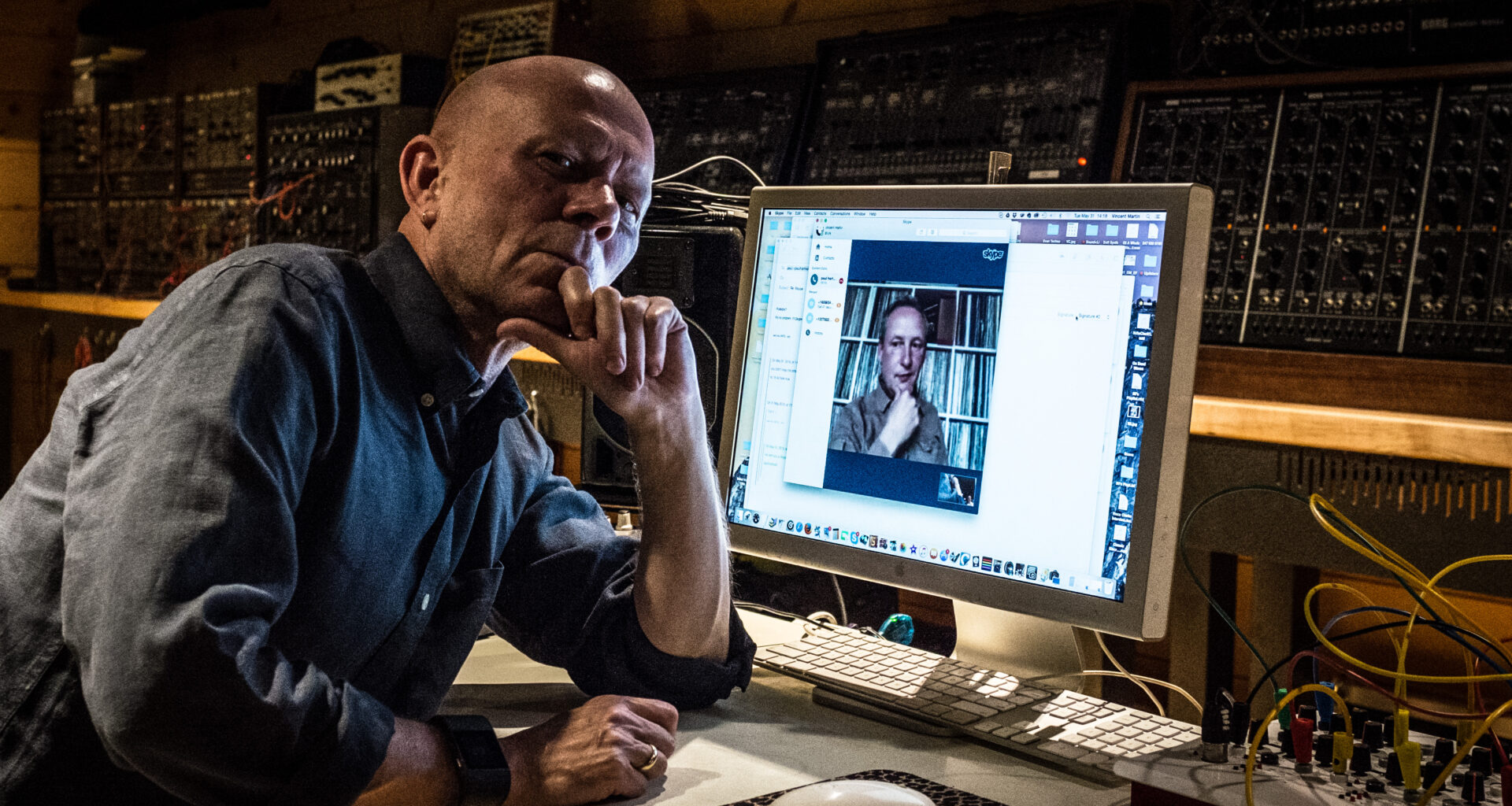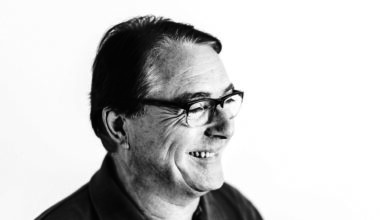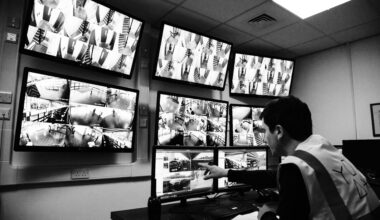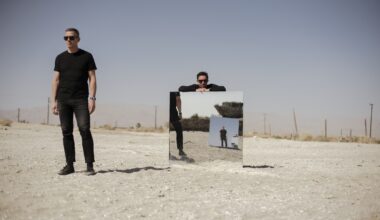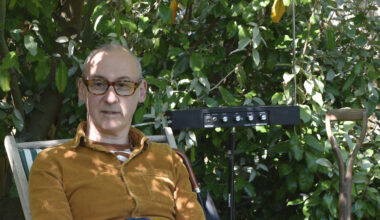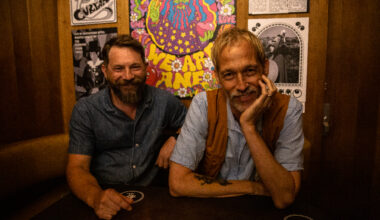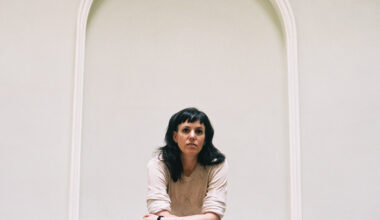Erasure with rave licks? Orbital with pop flecks? it’s an unlikely collaboration on the face of it, but these two electronic music behemoths have served up a proper treat in the form of Vince Clarke and Paul Hartnoll’s ‘2Square’. We pop round to Vince’s Brooklyn studio to discover more, while Paul joins in the conversation on Skype
Vince Clarke ushers me inside his New York brownstone on a quiet street in Brooklyn’s Park Slope neighbourhood and immediately offers an apology for not answering the door quicker. “I was just defrosting shrimp,” he says, offering a brief and mildly surreal insight into his intertwined home/work set-up, the boundary between which is two flights of stairs down to his studio.
The classic image of Vince Clarke is of someone hidden by technology. His time with first Depeche Mode, then Yazoo, and now Erasure, has usually seen him in the shadows – head down, busy, rarely smiling. In reality, Clarke is friendly, engaging and relaxed, with a sense of humour that’s clearly never lost any of its British dryness, despite his many years of living abroad.
Of course, his public image may simply be a general misconception. But it could also be down to the fact that Clarke has reached the point where the idea of spending most of his time on his own in his studio is no longer very appealing. It can be a mighty solitary existence.
“It does drive you crazy,” he admits. “You really need to have some kind of socialisation going on. Why make music otherwise? That’s what it’s about, isn’t it?”
This might explain why, as well as the three groups he’s been associated with over the last 35 years or so, Vince Clarke’s credits include a lengthy list of significant side projects. The most notable of these are the three albums he’s recorded with Martyn Ware from Heaven 17, two of them as The Clarke & Ware Experiment, and his 2011-12 releases with his old Depeche Mode pal Martin Gore under the name VCMG.
Clarke’s latest collaboration is with Orbital man Paul Hartnoll. The pair have just released an album called ‘2Square’ via Very Records, a download-only label run by Clarke. More of which later. Once we’ve settled down in a corner of his Brooklyn basement studio to conduct the interview, Clarke flicks on a computer and Hartnoll joins us on Skype from his home in Brighton back in Blighty. Judging by the sarcastic banter that’s traded back and forth, it soon becomes apparent that there’s a strong bond between the two men.
At first glance, however, this partnership seems quite surprising. You wouldn’t have put the two of them together in several months of Sundays. If you rewound back a couple of decades, you’d find Paul Hartnoll whipping Glastonbury crowds into a frenzy. By comparison, Clarke would be sitting at the bottom of a tower of equipment, pressing the occasional button while swigging from a bottle of Becks. Hartnoll believes the two have more in common than you might imagine, though.
“People say I’m a showman, but I also like to hide my face by wearing torch glasses,” he insists.
But while the paths of Erasure and Orbital didn’t have much reason to cross back in the day, there is a bit of Clarke in Hartnoll’s musical history.
“Depeche Mode performing ‘New Life’ on ‘Top Of The Pops’ was the first thing I ever taped with my brand new Ferguson VHS recorder,” he laughs.
The genesis of their partnership is actually more serendipitous, as is often the case. Erasure and Orbital shared a live backline technician, who played matchmaker for the pair.
“He knew that I was experimenting with some stuff on my own,” explains Clarke. “He’d heard some of the tracks and thought hooking me up with Paul might be interesting. So when we played in Brighton when Erasure were on tour in November 2014, I arranged to meet up with Paul. We went down the pub and that was it really.”
“Vince was trying to do something that was very specifically a house music project,” Hartnoll chips in. “He came to me with all these tracks that were in different states. He needed someone to help with the finishing process, which is quite difficult to do sometimes.”
“Especially working on your own,” says Clarke.
In a world where technology means that artists on opposite sides of the world can come together for a music project without ever actually meeting, the process of recording ‘2Square’ was a little more traditional. After Clarke had sent Hartnoll his initial files, the two met up last summer for a planning session before reconvening in Brighton just before Christmas to finish and mix the tracks.
“It was perfect studio weather,” adds Hartnoll. “That’s why we’re so productive in the UK. We have to spend a lot of time in the studio because it’s so crap outside.”
The pair would typically hunker down in Hartnoll’s studio in the Portslade area of Brighton after the Orbital man had completed the morning school run, toiling away each day until mid-afternoon. They spent most evenings hanging out together, or Clarke would take himself off to enjoy some of the creature comforts he missed from the UK, particularly decent fish and chips.
“Paul’s got a fantastic situation with his studio complex,” says Clarke wistfully. “People drop in, say hello, they all go to the local greasy spoon, and it’s just normal. I think that’s what I need right now. Being at home all the time, being down here” – he gestures around the windowless studio with a frown – “there’s nowhere to go. It’s also not a nine-to-five for me and I think you kind of need that.”
We’re about half an hour into the interview when things get a bit weird.
“Were we being squares?” asks Clarke. “It was squares, wasn’t it? I think it was squares.”
“We are quite nerdy, aren’t we?” responds Hartnoll after a slight pause.
“Geeky,” Clarke corrects him with a big grin. “That’s the cool way of saying nerds these days.”
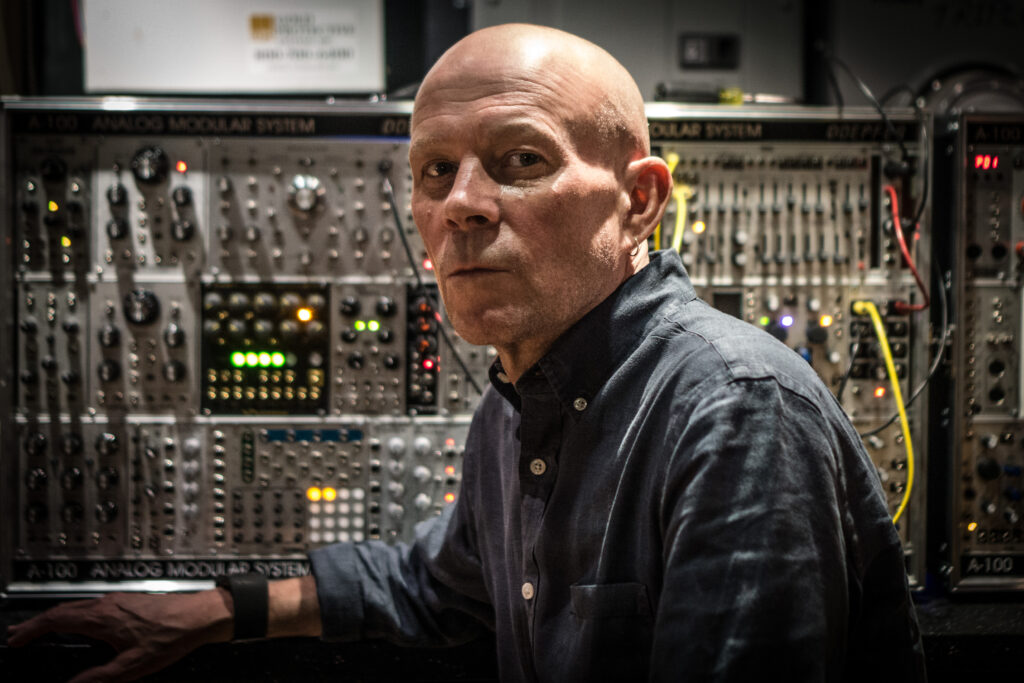
The pair are trying to fathom out how they came up with the title for their album. They eventually conclude they can’t remember at all.
‘2Square’ is kind of what you’d expect from the Clarke and Hartnoll combination. There’s the classic Clarke synth knowledge, held in lockstep by Hartnoll’s intimate familiarity with the dynamics and energy of dance music.
“We had a clear path,” says Hartnoll. “If at any point I was wondering what to do next, I just went back to the fact that we were doing house music. I wouldn’t make these into club mixes though, because that doesn’t make for a very listenable album.”
The pair initially dubbed the relaxed, fun style of the record “home house”.
“That was a bit of a joke,” says Clarke a little uncomfortably, suggesting said joke has run its course.
Dance music has become a staple part of Clarke’s musical diet in recent years. It’s the product of deep listening to the mechanics of rhythm. If his VCMG recordings with Martin Gore saw him immersing himself in techno, ‘2Square’ feels like it’s coming from more familiar territory.
“I think some of the tracks on the album have been inspired by this whole new disco thing,” says Clarke. “That groove, that 120bpm beat, brings back memories of when I was a kid listening to things like The Bee Gees’ ‘Stayin’ Alive’. There’s a great vibe to it and it’s all very polished and very precise.”
Another clue as to why ‘2Square’ sounds as relaxed as it does perhaps lies in the fact that neither of its creators could be described as young men these days. Not that either of them seem to mind. They both agree that getting older has its advantages.
“You lose that overly earnest, overly serious, furrowed brow thing,” suggests Hartnoll. “I certainly used to have the arrogance of youth but I never took myself too seriously, mainly because I was informed by bands like Kraftwerk, and they were totally silly. I’ve always found po-faced dance music people hilarious. The only ones who are smiling are the ones in their 40s who lived through the 90s. They’re all laughing at the young men taking it all far too seriously.
“When you’re that bit older, you’re not worried about what other people think. At the end of the day, you do the job, you enjoy it, you have some fun. I don’t want to spend the rest of my life staring at a computer screen, sitting in a white cube on my own.”
“I agree totally,” says Clarke. “I was arrogant as a kid. When you get your success early on, you just assume everything you do is going to be amazing. It takes years to find out that what you make or write isn’t necessarily gold. Working with other people lets you see their perspective on things and that’s been a life changer for me. Every time I’ve collaborated with someone, I can’t say that I’ve agreed with everything they’ve said, but I’ve been more prepared to listen as I’ve got older. When I was younger, I’d never have done that. I’d have just said they were wrong.”
Very Records isn’t Vince Clarke’s first crack at running a label. In the years after Yazoo collapsed, he ran the Reset imprint with Eric Radcliffe, the producer namechecked in the title ‘Upstairs At Eric’s’ and Clarke’s partner in The Assembly.
“That was just us having a laugh,” he says. “Reset was basically financed by RCA. Things were so different then because money was sloshing about in the music business. We had RCA people there all the time and all they’d say was, ‘That’s great’. There was a lot of bullshit around then. The whole model has changed so much now – and I think actually for the better. What I’m involved in now is much more real.
“There’s been a kind of democratisation of music making and it’s changed everything. When I look at it, if one of my artists makes a record by banging on a desk, there could possibly be somebody out there who would like to listen to it, but I would never be able to get that record to them were it not for the internet. There’s just as much crap out there as there’s always been, but at least it gives people the opportunity to express themselves.”
The initial idea for Very came to Clarke when he and Hartnoll were recording ‘2Square’.
“A friend of mine who lives in Brooklyn has a small label, a tiny download-only label,” explains Clarke. “He started telling me about it and I thought, ‘I could do that’. He said to make it download-only so you’re not left with hundreds of records under your bed. The concept is simple and the mechanism is easy, but it’s still a challenge for me. Anyway, I thought this record with Paul would be a fantastic start for the label.”
The only snag is that running a record company, even one with low overheads, still requires you to have some knowledge of the back end of the music industry. And as the one and only employee, Clarke suddenly found himself in charge of managing the marketing, sorting out the press and having a go at radio plugging, as well as trying to keep on top of a bulging inbox of demos.
“I hope I’ve learned a lot of stuff in a very short amount of time, stuff I had no idea about and probably should have been more interested in before now,” he laughs. “When Depeche Mode joined Mute, one of the first things that Daniel Miller did was take us to the cutting room and the pressing plant, which was sweaty as hell. This has been kind of like that for me. I kind of understand how everything functions. What also makes it different is that you’re fighting on somebody else’s behalf. I’m not really thinking about promoting myself with this record, I’m thinking more about promoting Paul.”
Mute Records, which Clarke has been a part of going right back to 1981, has been one of the inspirations for Very. He says he wants his label to have the same eclectic approach that characterised the Mute roster in the early days.
“The demos that Daniel got when Mute started weren’t Depeche Mode soundalikes,” he recalls. “At the moment, a lot of the demos I’m getting seem to have been influenced by Erasure and that’s not the way I want to go. I was thinking it would be a bit more obscure. I’ve already got another artist, a new artist, who I will be releasing in October and that’s not dance music at all. I can’t say much about it, but it’s very geeky.”
As we reach the end of our chat, Clarke returns to something we talked about earlier.
“Since I’ve got a bit older I’ve kind of started thinking, ‘Actually, you know what, I’m really enjoying what I’m doing’,” he reflects. “I’m doing the best I can and I feel good about that. In a lot of ways, life couldn’t be better. I think both Paul and I are in the very fortunate position that we can do that. We’re not struggling artists looking out for the next pay cheque.”
Two’s Company
How does Vince Clarke stack up as a recording partner, Paul?
“He’s alright,” sighs Hartnoll, before laughing loudly. “He likes to cut to the quick and get things where they need to be, so he’ll always edit out any wasted space. I’m all for that. There were always lots of ideas floating around the room.”
Clarke thinks there’s a lot to be said for working as a duo. As he points out, the appeal is pretty obvious.
“You’re dealing with just one other person, so decisions are more instant,” he offers. “If there’s two of you, then you can only fall out with one person, can’t you? Which is good. Either that or you get on with them really well. But even if you do fall out, that often makes for a better record.”
Is he suggesting there were lots of arguments during the making of ‘2Square’?
“Naaah, we had a great time, man,” answers Clarke. “Alison Moyet and I fell out. And I fell out with Depeche Mode. But then there were four of us, so we were always arguing.”
Bloody Kids
Clarke and Hartnoll have more than 50 years experience of bashing out electronic sounds between them. But music is not their only common denominator. They are both parents and having kids has opened them up to some occasionally harsh critics.
“My children are very kind,” notes Hartnoll sarcastically. “If there’s ever anything electronic playing around the house, they’ll always ask, ‘Did you do this music, dad?’. If I say yes, they’ll say, ‘What a load of rubbish!’. Which is funny because they usually think it’s brilliant until I say it’s one of my tracks.”
“My son just tells me how much he can improve whatever I do,” sighs Clarke. “He’s been using Logic for a long time. He’ll say, ‘If you do this, then it will be better’. He’s 10 years old.”
‘2Square’ is out on Very
